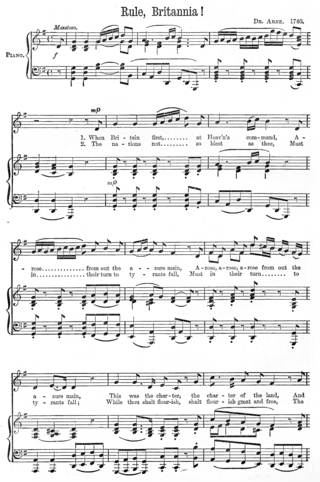Прав, Британіє, морями
Перейти до навігації
Перейти до пошуку

«Прав, Британіє, морями!» (англ. «Rule, Britannia!») — патріотична пісня Великої Британії, написана за поемою Джеймса Томсона на музику Томаса Арна в 1740 році.
Історія[ред. | ред. код]

Була написана до маскараду в домі Фредерика, принца Уельського, який виступав покровителем обох авторів.
Відома, головне, завдяки рефрену в кінці кожної строфи, який, власне, і дав назву пісні:
- Rule, Britannia! Rule the waves:
- Britons never shall be slaves.
Переклад:
- Прав, Британіє! Прав хвилями:
- Британці ніколи не стануть рабами.
Текст пісні[ред. | ред. код]
1
- When Britain first, at Heaven's command
- Arose from out the azure main;
- This was the charter of the land,
- And guardian angels sang this strain:
- "Rule, Britannia! rule the waves:
- «Britons never will be slaves.»
2
- The nations, not so blest as thee,
- Must, in their turns, to tyrants fall;
- While thou shalt flourish great and free,
- The dread and envy of them all.
- "Rule, Britannia! rule the waves:
- «Britons never shell be slaves.»
3
- Still more majestic shalt thou rise,
- More dreadful, from each foreign stroke;
- As the loud blast that tears the skies,
- Serves but to root thy native oak.
- "Rule, Britannia! rule the waves:
- «Britons never will be slaves.»
4
- Thee haughty tyrants ne'er shall tame:
- All their attempts to bend thee down,
- Will but arouse thy generous flame;
- But work their woe, and thy renown.
- "Rule, Britannia! rule the waves:
- «Britons never will be slaves.»
5
- To thee belongs the rural reign;
- Thy cities shall with commerce shine:
- All thine shall be the subject main,
- And every shore it circles thine.
- "Rule, Britannia! rule the waves:
- «Britons never will be slaves.»
6
- The Muses, still with freedom found,
- Shall to thy happy coast repair;
- Blest Isle! With matchless beauty crown'd,
- And manly hearts to guard the fair.
- "Rule, Britannia! rule the waves:
- «Britons never will be slaves.»
Запозичення[ред. | ред. код]
- Мотив пісні був використаний Георгом Фрідріхом Генделем в композиції Occasional Oratorio HWV 62[1] 1746 року.
